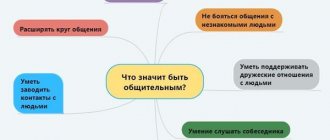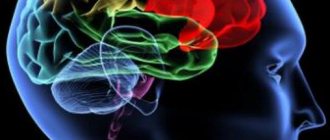In this article I will talk about how to develop intelligence. Here we will talk about the capabilities and potential of our mind.
But first, I would like to dispel a number of misconceptions and common myths about intelligence before moving directly to practical recommendations.
It is believed that intellectual abilities, type of thinking (mathematical-analytical mindset, humanitarian mindset) are given by nature and are further determined by upbringing and development in childhood, which sets the basic foundation for our type of thinking and level of intellectual development in adulthood. This is partly true, but only partly.
Wednesday measure your IQ
Let intelligence tests to assess IQ become a brain simulator on Wednesday. After all, they can be performed not only to measure the level of your mental development and IQ, but also for the purpose of intellectual training.
But these tests are usually solved within a given time. Therefore, first you need to see how much time you are allocated to solve the battery of proposed problems. Then note the time and begin the test.
By the way, by noting time, you thereby set yourself a certain bar for the future. Keep a record of the time you completed so that next time you can compare the old results with the new ones and track your progress.
Make up stories
The more detailed you can think of a problem, the more motivated you will be to solve it. For the first time, so as not to forget, it is better to remind yourself of what you decided to do. This could be a note on the refrigerator, an alarm on your cell phone, or other ways to remind you that you have decided to improve your life. 1. sleep at least 8 hours a day. Plus 100 to your appearance. A rested person looks younger and healthier. In addition, a good night's rest has a positive effect on the nervous system, a person feels calmer, behaves more confidently, and thereby makes a good impression on others.
What types of intelligence are there?
On the issue of mental abilities, it should be noted that everyone has their own intelligence, since there are a number of its varieties. By the way, they can be identified from childhood by the manner of communication, the interests of the child, his hobbies, thoughts, and reasoning.
- Analytical. The ability to analyze, compare, compare information, divide it into logical blocks, and identify relationships.
- Logical. A person is capable of reasoning, thinking and analysis without violating formal logic. This type has the ability to make logical, correct conclusions in the appropriate sequence.
- Critical. Receiving information, a person criticizes it, evaluates it, and easily weeds out everything superfluous, unnecessary, and incorrect. This is how a natural, pure opinion develops.
- Deductive. A person extracts individual, necessary information from the general volume, flow, and can formulate it perfectly. This type is able to generalize, find patterns in the interconnection of different information and group it into one single thing.
- Prognostic. The talent to plan, prevent, formulate future events in thoughts and at the same time keep in mind various options for solving a particular problem.
- Abstract thinking. A person can delve into the most complex abstract processes, most often this concerns mathematical and philosophical problems. These are brilliant individuals who are able to hold the most complex mathematical formulas and processes in their heads. They can quickly count addition, multiplication, and division of billions in seconds.
- Creative thinking. A person knows how to compare things of different importance from different sciences and quickly bring them to a common denominator. People are able to create, formulate various kinds of metaphors, decipher complex ideas and reduce them to a simplified level for easier understanding.
- Ability to concentrate. This point most likely applies to those who have great will and discipline, although without intelligence this would hardly be possible.
The human mind also has certain properties:
- Logic of architecture: everyone has a different degree of orderliness in their thinking. Someone thinks soberly, all thoughts are in “order,” while others have a chaotic, incoherent, chaotic mind.
- The breadth, depth of the human mind: the level of “smartness” of a person depends on this moment. If he is able to grasp a question, task, or object of thought more broadly and deeply, then he is smarter.
- Speed of performing mental operations. Here, perhaps, everything is clear. The faster a person thinks, the higher his thinking speed.
- Autonomy of thinking. Some people can think perfectly, regardless of the influence of external interference and factors. They are always calm, especially at the moment when they need to make the right decision, create an idea and bring it to life.
- Great RAM: It's about our memory. The better it is, the more information we can keep in our heads and use it at the right time. People with a good memory can recite poems by heart, retell books, multiply billions in their heads, divide them, formulate formulas.
Get enough sleep!
How to start self-development depends on everyone. If one person likes to read books on development, then another will love trainings and live communication. The most important thing is not to stand still, any action will be justified and will be beneficial. The conclusion of the article I read on this topic was the following. Any person, with enough effort, can master anything! The fact that technical specialists find it difficult to learn languages indicates that the mental qualities developed by the sciences are not related to those qualities of intelligence that are honed by knowledge of languages! In short, if you've been doing push-ups for a long time, you'll find it easier to pull the barbell from your chest because both involve the same muscles.
What factors influence a person's mental abilities?
The level of intelligence can vary significantly among different people. Among us there are intellectuals, slow-witted people, people with average abilities and those who are commonly called mentally retarded. But why are people so different mentally?
Various studies have shown that the formation of human mental abilities is influenced primarily by genetic factors. Upbringing, environmental influences and random external influences play a much smaller role.
However, the external environment also has a certain significance for the formation of intelligence. These are factors such as the standard of living of the family, the level of education of parents, the nature of upbringing, the availability of school education for children (in American studies, students from good urban schools turned out to be more intellectual than students from modest rural schools). Research has even established the influence of such individual factors as annual family income, the size of the house and its cost, the relationship between parents, etc.
The role of nutrition cannot be ruled out. The brain is a rather voracious structure, and a lack of nutrients can lead to a decrease in its ability to process information.
Why do we need to develop intelligence?
A strong mind does not always lead a person to success. A weak mind means a lot of troubles and problems. If a person listens only to his mind, it means he is led by his feelings. But leadership only by feelings will not lead to good.
The stronger the mind, the more adequate a person’s decisions are, and the more benefit his final behavior brings to himself and the people around him.
Exercises for the development of intelligence in primary schoolchildren.
- “Applique”: prepare several figures and parts cut out of paper, and invite your child to assemble some figure or unusual picture from them.
- “Associations”: invite your child to make one coherent sentence from three different words. Words can be completely different - the less connected they are, the more interesting the game. For example: rain, TV, girl; car, pedestrian crossing, music; phone, dad, school principal.
- “Come up with a new fairy tale”: invite your child to change the ending of familiar fairy tales and compose his own version. For example, “Kolobok did not sit on the fox’s tongue, but rolled further and met...”.
- “Find all the objects”: show your child several pictures with outline images of objects superimposed on each other. He must correctly indicate all the items. See what it looks like:
- “Invisible”: invite your child to find another in one word by rearranging the letters, for example: 1. Find invisible animals by swapping the letters in the words: Strength, salt, jar, peony. (Correct answers: fox, elk, wild boar, pony). 2. Find the invisible tree in the word: Pump. (The correct answer is pine). 3. Find invisibility clothing in the word: Lapot. (The correct answer is coat).
- “Confusion”: come up with a sentence and replace one word in it so that it does not fit the meaning at all. Invite your child to find the “lost” word. For example: “Vitya was basking in the sun, lying on the asphalt (actually on the sand)”; “It was hot outside, so Tanya put on a coat (actually a dress).”
- “Pairs of words”: select 8-10 pairs of words that are related in meaning. The child needs to read these pairs of words and remember them. Then you read the first word from each pair, and the child names the second from memory. For example: tree - forest; cat - kitten; music - piano; car - gasoline.
How to develop intelligence in a child
We need to remember about the peculiarities of the development of children's intelligence. Smartum specialists talked about how to productively deal with issues of additional education for children and gave recommendations for developing a child’s mental abilities. What nuances need to be taken into account and how to choose a suitable activity for children, taking into account its capabilities and future prospects?
To decide on the best activity for your child, ask yourself a few questions:
- What is your goal when sending your child to an additional education school or club? Versatile intellectual development, sporting achievements or development of creativity? Do your interests coincide with those of your child?
- What results do you expect from the classes and after how long?
- How ready is the child for heavy physical or psychological stress?
It is extremely difficult to predict in which area a child will be able to express himself best and achieve success. Parents sign up their children for several classes and expect great results from each. But first, it is better to give the child the opportunity to prepare - to develop the skills of concentration, perseverance, and improve memory. Mental arithmetic will help with this.
Teachers at the Smartum Mental Academy work with children aged 5 to 16 years, and see each of them as a potential genius. Why is mental arithmetic the best way to develop a child’s IQ? There are several reasons for this:
- Mental arithmetic classes are aimed at the uniform development of the left and right hemispheres of the brain. A high level of development of both hemispheres, for example, like Einstein, is considered a sign of genius and the key to success. Interesting, varied lessons in mental arithmetic can captivate any child, thereby strengthening his interest in knowledge and creativity.
- The results of practicing mental arithmetic are photographic memory, increased concentration and the ability to perform mental calculations.
- After just 2–3 months of regular attendance, children experience an increase in school performance. The child completes his homework faster and has time to attend additional clubs and courses that interest him.
The Smartum Academy of Mental Arithmetic hopes that the recommendations on developing a child’s mental abilities were useful to you.
Smartum specialists are confident that every student has great potential and are ready to help him become confident in his abilities and successful in the future. Sign up for your first free lesson!
Where should the boundary be drawn between feelings and reason?
Instincts must exist and act in the place that is assigned to them. Since they have already saved a person’s life more than once, it is necessary that their mechanism starts when needed. Most of the material on this site will be devoted to how to achieve this.
For example, in case of danger, fear signals it and this is great. The body releases a lot of energy and, fleeing from a wild animal in the forest, you yourself don’t notice how you find yourself high in a tree, because fear made you react instantly and saved your life. But there is no need to allow this ancient instinct to break out from the depths of the unconscious and occupy other areas of our psyche.
Being in them, he can manifest himself in the most perverted forms. For example, in the form of all sorts of social fears: anxiety about people, about life’s difficulties, about relationships, about the future, about the opposite sex. If the biological mechanism that catapults us high onto the branches of a tree saves our life, then another, social or psychological fear is exclusively an obstacle to the implementation of our life plan, our goals and our development.
A person who is afraid of difficulties will never achieve anything. He will live with his fear. Anyone who is afraid of relationships will die alone. One of the key tasks of the mind in the context of self-development is to curb and control the ego and instincts, to tame the wild beast within and make it your ally. And also to pacify the Ego: to act contrary to the whims of pride, the whims of pride, not to take into account passions and fleeting emotions, but confidently, chart your life course and move along it.
Ways to increase intelligence
How to increase intelligence without resorting to pills? The main advice is to throw laziness aside and start paying more attention to yourself. This is not easy to do; your strong desire to develop your erudition is enough.
Reading books
It is books that stimulate the active functioning of the brain. It’s not for nothing that they say that reading is a good prevention of Alzheimer’s disease in old age. Let your reading be varied - read classics, journalism, scientific journals - you can always maintain a conversation on any topic. Choose famous authors. Books that increase intelligence are those that make you think and reason. What books should you read first? We recommend familiarizing yourself with Russian classics; popular novels and newfangled detective stories can wait.
Below is a list of books that promote intelligence development:
- “Intelligence training”, Anna Rodionova;
- “Brain 100%”, Olga Kinyakina;
- "Fundamentals of Rote Memorization" by Zach Belfort;
- "Six Thinking Hats" by Edward de Bon;
- "Develop your intellect...", Philip Carter.
Learning foreign languages
This is not only useful for the development of memory and intelligence, but also very interesting. Firstly, abroad you can find a common language with the locals. Secondly, it will open up new opportunities for you in your professional field. A foreign language will definitely be useful to you.
Puzzles for the brain
Spend more time on educational games - involve your child in them. Riddles, puzzles, crosswords, board games - chess, checkers - help well. They not only train the brain, but also develop perseverance, patience and concentration.
Sports activities
During exercise, the brain receives oxygen, which is so necessary for its normal functioning. The risk of developing an affective syndrome is reduced - a person becomes calm and more reasonable, which has a beneficial effect on his desire for knowledge. During exercise, special cells are produced in the brain that are responsible for mental abilities. Sport is a great helper in your intellectual endeavors.
Rejection of bad habits
Increased intelligence does not threaten you if you have bad habits. Smoking and alcohol, not to mention more severe forms of addiction. Regular intake of alcohol and nicotine into the blood reduces the production of mental abilities. Unfortunately, the consequences of this process are irreversible.
Be curious
Try to learn something new every day. For example, watch a new movie or listen to a new artist. Good music, especially classical music, has a good effect on cerebral circulation. Try to master the exact sciences, even if they disgusted you at school.
Expand your social circle
Let as many smart and educated people as possible appear in your environment. This will allow you to become smarter yourself, plus it is an excellent motivation to learn new areas of science. There is always something to discuss with interesting people, and, as you know, truth is born in a dispute. And it will be useful for you to gain similar experience - in the process of communicating on controversial issues, your intellect develops well.
And most importantly, give up the idea that your intelligence cannot be trained. Everything is in your hands and in your head. The more involved you are in the process of developing your intellectual abilities, the more you will enjoy it. It’s like with a habit - first you work to form it for 21 days, then it works for you. And, of course, remember about healthy sleep and a healthy varied diet. The brain, like your physical body, needs training.
Increase focus
Concentration is another essential requirement for any intellectual achievement. Intellectual development of a person occurs only under the condition of concentration on the subject. Let's look at several methods that will improve focus and motivation, and thereby increase the productivity of intellectual work.
- Reducing the number of assigned tasks. It’s good if there are no more than five or six of them for the next three months. Why this particular number? Firstly, consciousness cannot concentrate on large amounts of information at the same time. Three months is the period during which you can be focused on a goal without the danger of “burnout”, since the goal will not get boring. In addition, this period allows you to see real progress. Which will provide motivation to move on. Many programs for personal development are designed for just this figure - three months. For example, a weight loss program.
- Determining the main, or “key” goal. This goal should provide so much energy that it is enough to achieve secondary goals. After all, if you look at your list of tasks, you will probably notice something in common between all of them. A key goal is one that helps achieve the other goals.
- The next exercise that will help increase your focus on any task is answering the question “Why?” You need to clearly understand what studying Hindi, programming or economic theory will give you. Usually the answers come intuitively. But if difficulties arise at this stage, you can expand the question by adding a few more points: what will completing this task give me? How will I feel when my goal becomes a reality? What new horizons will open up for me?
- Visualization of the goal. In order for the mind to be fully concentrated on solving a problem, it is necessary to imagine the end result as clearly as possible. The subconscious is millions of times more powerful than consciousness, and it, as you know, thinks in images. For visualization, you can use various means at hand: create a “dream collage”, carry photographs or newspaper clippings in your wallet. You can also sign the necessary affirmations with them.
Top 10 recommendations on how to increase your IQ level
Since IQ is directly related to brain activity, you should think about how to improve its efficiency. Use the following tips.
- Lead a healthy lifestyle. In order to think sensibly, think better and faster, master the required amount of information and at the same time stay in good shape, you should follow basic rules: eat a balanced diet, do not overeat, do not starve, do not smoke, do not indulge in alcohol, spend more time outdoors, be active, move more, play sports or do gentle physical exercise.
- Balance work with rest. The brain, like the body, needs to rest. If you spend 24 hours improving your intellect, the first thing to fail is your head. Doctors advise choosing the number of hours of sleep that the brain requires for full recovery. A reasonable balance between rest and work will allow you to better perceive everything you want to learn for your development.
- Read regularly. Reading is one of the best ways to “wake up” your brain cells. It develops imagination, speech, enriches vocabulary, broadens horizons, and increases educational level. This is generally a unique function - it allows the head to work and rest at the same time, switching the brain to another type of activity.
- Find intellectual forms of entertainment for yourself. Physical activities can be successfully alternated with intellectual ones. Educational games, crosswords, educational quests, logic and imagination tasks - all this is recommended not only for the younger generation, but also for adults as a preventive measure for strokes, dementia and other diseases associated with weakening of the intellect. One of the useful types of recreation can be visiting lecture halls, intellectual clubs, interactive museums, and even libraries, which today are equipped with modern technology and host many interesting events.
- Learn foreign languages. This is not just a way to learn to understand other people, but also a great opportunity to learn about another culture, traditions, get acquainted with the original texts of books, watch the best films and performances, and find new friends with similar interests. In addition, language develops memory, which means it activates brain activity, which helps improve intelligence.
- Watch educational programs and films. This is one of the best options to expand your horizons. Documentary films, travel shows, educational television programs or scientific films will allow you to go beyond the usual and often rather narrow boundaries of your own interests.
- Try to study the exact sciences. Intellectual scholars will confirm that the boundaries between the exact sciences and the humanities are often very blurred. It is no coincidence that, for example, mathematics is called the music of the mind. Both children and adults are often recommended to solve entertaining problems for intellectual development. And acquaintance with miracles and discoveries in other sciences incredibly enriches the human mind.
- Change established habits. A monotonous lifestyle, otherwise known as routine, greatly inhibits development. Change your daily routine. Change your route when going to work. Devote your weekend to something unusual for you. Make a cultural and educational plan for the week. Plan a “meaningful” trip for your vacation - for example, visit all the castles in Austria, visit all the Orthodox churches in Crimea and learn their history, go on a culinary tour of Italy and learn how to cook Italian dishes. Rate the best books for the mind and heart and gradually read them.
- Learn new skills. Take an interest in the intricacies of other professions, master a different specialty, and use your experience to expand your own sphere of employment. If you have always been interested in history, sign up for an archaeological expedition, sing well - learn to dance well, take guitar lessons, go to courses in mastering some craft. New experience always means new knowledge. And the opportunity to learn is the first step to increasing your intelligence level.
- Train your brain with IQ tests. There are many different intelligence tests available in the public domain on the Internet. Set yourself the task of completing as many of them as possible. How to increase your intelligence level - go from simple to complex. If something doesn’t work out the first time, don’t be afraid to go back, use supporting literature, scientific consultations, and reference books.
And keep in mind that in self-development, high results are not always important. The process itself carries no less, and sometimes more, intellectual charge.
Secrets of intelligence development
Before you start developing your intellect, you need to learn one rule: classes must be comprehensive and regular. An example is sports. To improve your health, you need to give up bad habits and add physical activity, for example, by purchasing a gym or swimming pool membership. The same thing happens with the development of emotional intelligence and mental abilities. You shouldn’t think that rare reading or problem solving is enough for development. We need complex actions, implying the presence of theory and practice.
Many people understand the importance of developing mental abilities. However, they do nothing in this direction
This is due to laziness, unwillingness to change habits and leave the comfort zone. In addition, most people want to find easy ways to solve problems, and not strain themselves by working on themselves. It is this feature of human nature that prompts people to buy advertised weight loss products or exercise equipment.
Achieving a goal requires effort, discipline, and willpower. Only with the help of these qualities can you force yourself to regularly devote time to developing your mind.
Why should instincts and ego be restrained?
If we don’t chase precise formulations and talk about the concept of awareness, then awareness implies the autonomy of the mind, its independence from feelings. This is the ability for a detached, sober analysis of what is happening inside you, what motives guide you, and why you act this way and not otherwise. Mindfulness rewards you with the ability to separate the wheat from the chaff: to draw the line between genuine goals that lead you forward and momentary impulses, emotions that pull you back or to the side.
Your life project is a lighthouse, the light of which flickers faintly somewhere in the distance. And the weaknesses and momentary impulses generated by the Ego are attractive siren songs that lure you, lead you astray. And now you are moving in a different direction. And the entire crew, intoxicated by the voice of mythical creatures, lost their minds and threw themselves overboard. You, as a captain, no longer control the team!
Emotions, desires and passions that you do not control instill chaos in you, intoxicate you and become the causes of confusion, which causes rash actions that you later regret. And if you live by reason, then you gain freedom from manifestations of the Ego, and become your own master. An incomparable feeling of control over what is happening inside appears.
This is much better than feeling like a puppet of your desires. And it’s even worse when following the Ego becomes a habit. You begin to perceive it as a part of yourself, your personality, as something enduring that will remain with you for centuries. This is the biggest mistake that can happen here:
His best trick was that he made you believe that he was you.
-x/f Revolver
Popular
Mathematics October 18, 2019
How to explain the composition of a number to children?
Knowledge of the composition of numbers is the foundation on which further mathematics education will be built. It is necessary to teach the child to cope with such tasks and then at school it will be much easier for him to master addition, subtraction, division and multiplication.
Love of learning September 25, 2019
Game find the odd one out: word, figure, object.
Problems and games for finding extra objects, words and figures allow you to train your logic and attention skills. It is necessary to start developing these skills from early childhood. Invite your child to solve the problems that we have prepared for you and practice!
Mathematics August 26, 2019
Find a pattern
A pattern is a regular, stable relationship in the quantities, properties and phenomena of objects. In a mathematical pattern, you need to find an algorithm according to which in a chain of numbers they are repeated, changed or replaced in accordance with the established rule.
Development of intellectual abilities of schoolchildren
From elementary school, boys and girls urgently need to develop critical and logical thinking (detailed information with a specific solution -).
At the age of 6-10 years, a person’s mentality is formed - analytical, visual-figurative or mixed.
Already in elementary school, children should actively develop:
- working memory (the ability to hold several intermediate facts, decisions, conclusions in the head);
- skills of ordering thoughts in judgments, striving to build the correct architecture of thinking;
- the ability to draw conclusions from the received arrays of information;
- Gradually increase the speed of performing analytical and other operations.
To better understand how to develop intelligence in a child, how to be able to help him improve his mental abilities, you need to realize:
- only comprehensive work on increasing intellectual abilities in primary school age (logic, creativity, erudition, emotional, social and practical intelligence) will form a successful personality;
- a pronounced tendency towards analytical thinking does not cancel creative impulses, they only “hide” behind logic, but they can and should be developed in order to raise a harmonious personality;
- It is necessary to increase your intellectual abilities not only at the computer or in another relatively passive way, but also through sports: the undisputed leaders are chess, karate; Any team sports, general physical training and athletics are also useful.
Exercises to develop intellectual and creative abilities in younger schoolchildren
In the first grades, children do not yet learn mathematics; they are just beginning to be introduced to the course of arithmetic. However, it is already possible to solve simple problems of searching for patterns and other logic tasks with them.
The LogicLike educational website includes more than 2,500 entertaining educational tasks for children. Register
and show it to your child.
Such exercises are excellent training in the ability to think and reason. Those exercises that are recommended for younger children are also effective for the development of intellectual abilities at primary school age (see more details above about logic riddles, tasks and intellectual games).
The period from seven to ten years is the most intense in terms of intellectual development.
At this time, nature itself helps: the child’s sense of competition intensifies and voluntary attention and conscious interest in analytical activity are formed. You can safely add to mathematical and logical problems:
- tasks on spatial thinking (figures and their development, reflections, etc.);
- chess - perfectly develops the intellect and motivates with the opportunity to surpass your opponent in flexibility and inventiveness of the mind; – are able to teach even a beginner to play chess at a decent level and significantly increase interest in this game;
- various puzzles for verbal-logical, visual-figurative and abstract-logical thinking, creativity, ingenuity and ingenuity, including truth and lies tasks, algorithms, puzzles with matches and much more.
The comprehensive training program is structured in such a way that the level of difficulty in each category of tasks gradually increases. Where to begin?
As a result of completing a course in the development of logical thinking and intelligence, a 10-12 year old child will not only be able to solve such complex problems that many adults may not be able to do, but also in many aspects of intellectual development will be two heads taller than their less purposeful counterparts. peers.
Middle school and adolescence
From the age of 10-12, in classes for the development of intelligence, you can focus on competition or on an entertaining and playful form of pastime with benefits for the mind and mood. Perhaps the best answers for any parent to the question of how to develop intelligence in a schoolchild:
- various Olympiads (real and “game”, at school and at home between friends);
- entertaining competitions for solving logic problems;
- family, friendly and official chess tournaments;
- joint solving of Sudoku, solving crossword puzzles;
- guessing rebuses, logical riddles, tasks and puzzles for logic and ingenuity, and much more.
Influence
Psychologists believe that the development of intelligence and quick thinking is influenced by two groups of factors - biological and social.
Biological
- Heredity factor (structure of the central nervous system, speed of information processing, reaction time, etc.);
- Age (sensitivity of a particular age period, characteristics of the age group, etc.);
- Sexual (sexual intellectual capabilities, physiological characteristics of gender, etc.).
Social
- Environmental factor (primary environment, cognitive climate of the family, team, informal groups, etc.);
- Social (social foundations, national traditions, dominant culture, socioeconomic status, subculture to which a person has joined, etc.);
- Factor of motives, needs (motivational sphere and sphere of needs of the individual, motives of one’s own intellectual activity, the presence of a stable motivational need, a value system, incentives for activity, etc.);
- Experience factor (previous life, practical mental experience of the individual, etc.);
- Compensation factor (the presence of compensatory capabilities of the subject: willpower, perseverance, perseverance, patience, determination, etc.);
- Operational (education, erudition, knowledge experience, practical skills).
Each of these factors has a positive or negative effect on the intellectual development of an individual.
It is important to understand the most important thing: intellectual development is the formation of personality qualities necessary for a person to live a full life in modern society: clarity and accuracy of thought, criticality of thinking, intuition, logical thinking, elements of algorithmic culture, spatial concepts, the ability to overcome difficulties, methodology for obtaining new ones knowledge and its use in practice.











